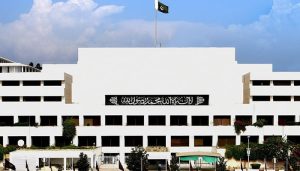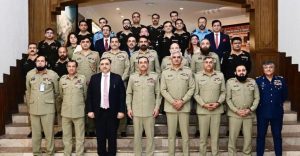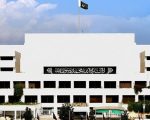LAHORE – Nestlé Pakistan Water Plan unveiled at Lahore University of Management Sciences (LUMS) last week to drive the need for collective action on a shared water resource.
The plan aims to bring together multiple partners to preserve and protect water resources by leveraging research and technology to reduce and recycle water, introduce sustainable agricultural techniques to reduce water use vis-a-vis increased yield, and provide access to clean and safe water within communities.
The coalition was led by Nestlé Pakistan with LUMS, Sustainable Development Policy Institute (SDPI), WWF Pakistan, Department of Agriculture, Govt. of Punjab and Pakistan Agriculture Research Centre (PARC).

Pakistan is the third most water stressed country in the world, with current per capita annual water availability 1,017 cubic meters (down from 1,500 cubic meters in 2009). There are scientific guesstimates that the country may run dry by 2025 if we do not take immediate, collective action.
NESTLÉ PAKISTAN’S COMMITMENTS
“Water is critical to every part of our value chain, from farm to factory. Being an industry leader people, governments and civil society expect us to play a leadership role in water management. That is why we have identified opportunities to optimise water use in factories, watershed, agriculture and communities,” said Dr Magdi Batato, EVP and Head of Operations Nestlé.

At the occasion, Nestlé Pakistan’s MD Bruno Olierhoek declared Nestlé Pakistan’s commitments to the water cause in the coming few years. “Our Sheikhupura Factory was Alliance for Water Stewardship (AWS) certified in 2017 and we aim to get the remaining three factories certified by AWS standards by the end of 2019,” he said.
“We will increase the number of drinking water facilities to 7 in 2018 with a new installation in Kabirwala. Furthermore, we want to promote drip irrigation amongst other water efficient initiatives.
“By the end of 2017, drip irrigation will be implemented on 68 acres leading to a water saving of 147 mio litres which will be further extended to 185 acres resulting in savings of over 400 mio litres by the end of 2019,” he added.
Dr Syed Sohail Hussain Naqvi said, “LUMS is proud to play a role in addressing the water scarcity issue as it is imperative that we come together to resolve this for our present and future generations.”

Speaking at the occasion, SDPI Executive Director Dr Abid Qaiyum Sulehri said: “There was a time when we thought we would never run out of natural gas and today it’s the same dire situation with water. Water is imperative for us both in addressing our energy and food security concerns.”
Agriculture Secretary Captain (r) Muhammad Mahmood said, “Water is life. Currently, Pakistan has a water storage capacity for just 30 day. We have been struggling to maintain adequate surface water supply for the past three decades.”
Hammad Naqi Khan CEO WWF Pakistan said, “WWF Pakistan is proud to have played an important role in facilitating Nestlé Sheikhupura factory achieve Alliance for Water Stewardship (AWS) Certification and become the first factory in Pakistan and the first factory in the Nestlé World to do so.”














